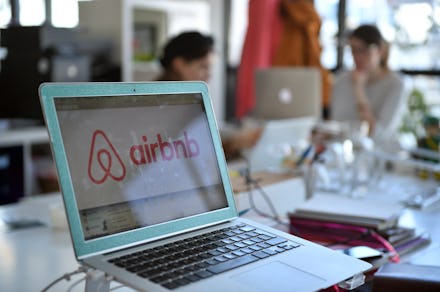An Airbnb Host Rejected a Woman Because She's Trans. Is That Legal?

On Sunday, Shadi Petosky tweeted a message from an Airbnb host denying her a rental explicitly because Petosky is transgender. "I have a 13-year-old boy going through puberty. I don't want him to feel any discomfort in his own home," the message reads.
Petosky's not the only one complaining about discrimination on the rental site. Her claim follows #AirbnbWhileBlack, a movement on Twitter spotlighting instances of discrimination against African-American guests — a problem that's statistically widespread. Ironic, considering the rental platform's logo — the bélo — is a symbol of belonging.
The incident itself took place in 2013, Petosky told the Guardian. She reported the message to Airbnb when she first received it, but Airbnb didn't remove the host — the site actually made her a super-host, Petosky said.
In a tweet, Petosky added, "I only posted 'cause Airbnb is under scrutiny for discriminatory stuff, and they didn't do anything." It wasn't until Petosky tweeted about her experience that the host was removed.
The terms of service
In an email, Airbnb spokesperson Nick Papas told Mic, "Discrimination has no place in the Airbnb community. We are removing this host from Airbnb."
Airbnb has an anti-discrimination policy in place that prohibits discriminatory content and requires hosts to follow the Fair Housing Act and the Americans With Disabilities Act.
But here's where things enter a gray area: The FHA doesn't apply to all hosts, as Airbnb states in its own explainer. There are exemptions for "owner-occupied buildings with no more than four units, single-family housing rented without the use of a broker if the private individual owner doesn't own more than three such single-family units at one time, and housing operated by organizations and private clubs that limit occupancy to members and so long as all advertising is nondiscriminatory."
In other words, some Airbnb hosts can skirt the anti-discrimination laws.
Craig Gurian, executive director of the Anti-Discrimination Center, doesn't think there should be any exception for Airbnb just because it's a consumer-to-consumer startup.
"There is no exception to the rule that says, 'We're cool, we use the phrase 'sharing economy,' so we don't have to obey the law,'" Gurian said in a phone call on Monday.
If hosts are denying guests based on race, gender, sexuality or disability, Airbnb is "unquestionably responsible for the widespread discrimination that its business model facilitates," Goodman said.
Rachel Goodman, a staff attorney of the Racial Justice Program at the American Civil Liberties Union, echoes Gurian's conviction — that there is no exception for Airbnb just because it is part of a newer business model. "There is no carve-out from the anti-discrimination laws for sharing-economy businesses," she said in an email on Monday.
If hosts are denying guests based on race, gender, sexuality or disability, Airbnb is "unquestionably responsible for the widespread discrimination that its business model facilitates," Goodman said.
The law
The Fair Housing Act "protects people from discrimination when they are renting, buying or securing financing for any housing," according to the U.S. Department of Housing and Urban Development. "The prohibitions specifically cover discrimination because of race, color, national origin, religion, sex, disability and the presence of children."
As Airbnb's website states, the FHA is applicable to hosts "in most housing-related transactions, with a few limited exceptions."
Airbnb puts the burden to comply with anti-discrimination laws on its hosts, but Gurian doesn't think that it can claim an exemption on the basis that it only transmits the advertisements. If a company is subject to the FHA, it can't delegate its obligation to comply with the act, Gurian said.
The law that has this exemption, section 230 of the Communications Decency Act, absolves internet service providers from liability from third-party content, but Gurian said this doesn't apply to Airbnb. There is a business arrangement between Airbnb and each host — Airbnb gets a piece of the pie, so that makes it Airbnb's content and, in turn, Airbnb's responsibility — not just the host's.
What we can do
"There are definitely ways to use the existing civil rights laws to hold Airbnb accountable, but you have to have the political will," Veena Dubal, a professor of law at the University of California, Hastings, told the Guardian. "You have to find someone in the [civil rights division of the Department of Justice] that's willing to go out on a limb."
The laws have not caught up to modern business models. Airbnb has anti-discrimination policies in place, but there are exceptions, like Petosky's case, and they could spell trouble for the company.
"If Airbnb wants travelers to turn to its hosts instead of to hotels, it must assure the public that discrimination is as impossible on Airbnb as it is on Expedia," Goodman said.
Airbnb offers unconscious bias training to its team members and many of its hosts, the company said in a memo issued June 2. It also asked Laura Murphy, the former head of the American Civil Liberties Union's Washington, D.C., legislative office, to help lead its efforts against discrimination.
"While we all know that the challenge of unconscious bias has plagued societies for centuries, as a company we are responsible for doing all we can do to fight discrimination — and all of the pain it causes — and create a fair community on our platform for everyone," Airbnb said in the memo, obtained by Mic.
The memo doesn't specify whether it'll hold its hosts accountable for discriminatory acts without exception.
June 7, 2016, 11:05 a.m.: This story has been updated.